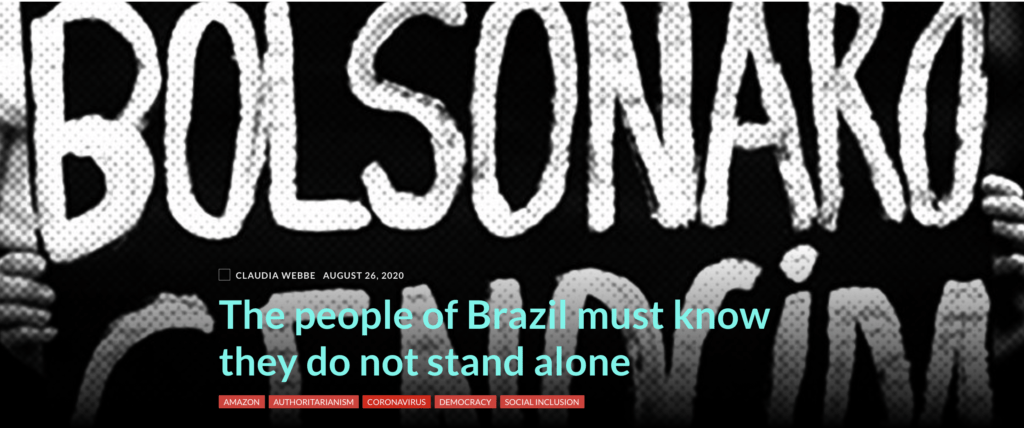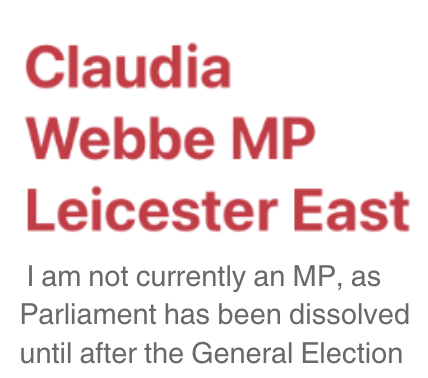
The people of Brazil must know they do not stand alone
By Claudia Webbe MP
At the time of writing (August 26), Brazil has the second most cases (3,622,861) and deaths (115,309) from Coronavirus in the world.
Many health experts believe these already horrendous figures are a massive under-reporting of the real situation.
Despite this devastation, Brazil’s far-right President Jair Bolsonaro has continually taken an extreme and dangerous denialist approach to the pandemic, calling it ‘a little flu’ and ‘media hysteria’. In line with his devout devotion to neo-liberalism, Bolsonaro has refused to promote or implement the typical raft of life-saving measures to deal with the crisis.
In the country currently there is also a very real risk of further transmission to remote indigenous communities, for whom highly infectious diseases pose a devastating threat.
Recent figures suggest at least 542 indigenous people have died from COVID-19.
In total, more than 16,000 COVID-19 cases have been registered among 143 Indigenous communities, yet Bolsonaro recently vetoed 16 sections of a law that would have required the government to provide drinking water, disinfectants, and hospital beds for Indigenous people during the pandemic.
Brazil’s national indigenous organisation the APIB has described as “humiliating” the government approach to the pandemic among indigenous peoples, and has said that “The disease affects every day thousands of indigenous people in the region who live in and outside traditional territories.”
On June 30, the organization also went to court to attempt to force the regime to take measures to protect the indigenous population. The petition, signed by 305 indigenous communities, most of them in the Amazon, urged the government to put in practice an emergency plan to combat the COVID-19 pandemic and save lives.
The threats facing these indigenous communities are very real, with the World Health Organization General Director Tedros Adhanom Ghebreyesus recently saying that the “WHO is deeply concerned about the impact of the virus on indigenous peoples in the Americas, which remains the current epicentre of the pandemic.”
Indigenous communities in Brazil already faced systemic discrimination, economic disadvantage, and limited access to health services before this pandemic, which means its effects are extremely severe.
They also face a threat to the places they live in from climate change and the deforestation of the Amazon.
In July several environmental organizations filed a request with the Federal Courts of Accounts for an audit on the environmental policies carried out by Bolsonaro´s administration to combat fires in the Amazon, accusing the far-right President of “dismantling of environmental policy” rather than using the resources allocated to this vital cause.
This concern has been stoked by the revelations that fires in the Amazon region are increasing, with the first six days of August seeing 5.860 fires recorded, an increase of seven percent compared to the same period last year.
The fires increased 28 percent in July in comparison to the same month in 2019 and additionally about 1,000 fires were registered just on July 30, the highest number in a single day since 2005.
Brazil’s Amazon Environmental Research Institute (IPAM) science director Ane Alencar has said “September will be even worse.”
Many of these fires are in areas illegally cleared of forest, meaning that they are a direct result of Bolsonaro’s decisions to actively promote deforestation, and his decision to encourage agricultural and mining activities in the region in line with his hard-line neo-liberal economic policy in what can only be described as a state sanctioned land grab.
Indeed, even before he was in office, Bolsonaro said he would curb the ability of the country’s environmental protection agency to fine offenders, and this message was received loud and clear by those grabbing land illegally. In the year to last August, forest clearance in the Amazon increased 29 per cent. Yet Bolsonaro kept his word, with the number of fines and sanctions applied by environmental institute Ibama falling dramatically since he assumed office.
Between 1 August 2019 and July 31 2020, 9,205 sq km (3,550 square miles) of rainforest were cleared – a rise of 33 per cent compared to the same period in 2018/19.
More widely speaking, according to the Climate Observatory’s statement, since Bolsonaro came to power there has been “the veiled closure of the Ministry of Environment, the shelving of plans to fight deforestation in the Amazon and the Cerrado (savanna) region, the disregard for the Paris Agreement, the harassment of inspectors and the ideological and illegal omission to invest in the fight against environmental crimes, despite a budget of nearly US$ 400 million in unspent funds to do so.”
Resistance to Bolsonaro though is growing across society. In addition to the aforementioned environmental and indigenous groups, there is a growing Black Lives Matter movement and trade unions have also upped their struggle against the Government.
A recent day of national mourning was called by unions including those representing mining, oil and health workers, with protests drawing attention to the regime’s disastrous handling of the pandemic. Health workers unions have been particularly vocal in light of at least 195,516 health workers being infected.
The health-sector UniSaude union has filed a complaint in the International Criminal Court (ICC) against Bolsonaro for crimes against humanity, saying that “Bolsonaro’s management of the pandemic has been criminal and negligent. He has risked the lives of health professionals and the people.”
Supporting the move, nurse Jhuliana Rodrigues explained that “our accusation shows the people’s pain and concern about the health crisis.”
Trade unions have been targeted by Bolsonaro, who claimed “there is an excess of rights” for workers in the country and has since abolished the Ministry of Labour.
This is only likely to get worse with the Brazilian Institute of Geography and Statistics estimating the pandemic has already led to 7.8 million job losses, and the far-right likely to scapegoat black people, trade unions and anyone else they can to blame for the country’s difficulties, rather than take responsibility for the deadly consequences of their deadly failure to put people and health before private profit.
The people of Brazil must know they do not stand alone – and we must build a massive international solidarity movement in support of them.
Claudia Webbe MP is the member of Parliament for Leicester East. You can follow her at www.facebook.com/claudiaforLE and twitter.com/ClaudiaWebbe


